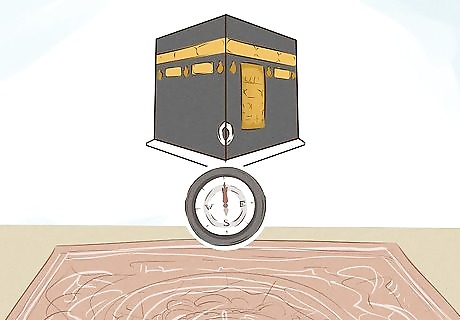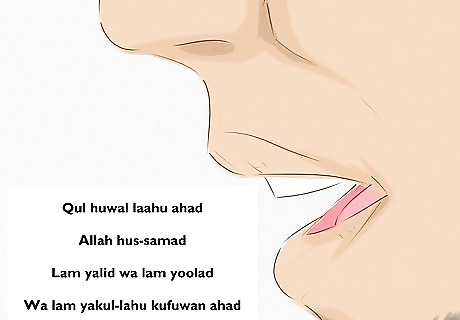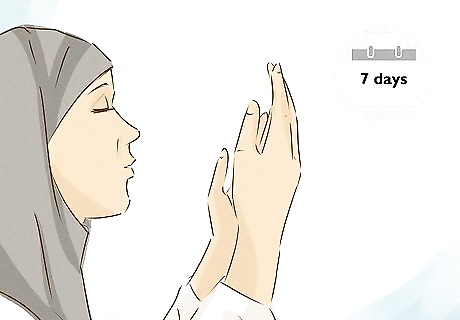
views
Performing the Salat-al-Istikhara

Perform Ablution or Wudu. Before starting prayer, you should perform Wudu to ensure you’re clean. Center your thoughts, then wash and rinse these areas three times: your hands, mouth, face, nose, and lower forearms. Wash your head and ears once, then wash your feet three times (starting with the right foot). You can then point your right index finger to the sky and recite a prayer of witness: "Ash-hadu al laa ilaaha illALLAHu wahdahuu laa shariikalahu, wa ash-hadu anna Muhammadan 'abduhuu wa rasuuluh." The English translation is, "I bear witness that there is no deity other than Allah alone; He is One; He has no partner and I bear witness that Muhammad (Peace be upon Him) is His (chosen) servant and (true) Messenger." In some cases, you may need to perform Ghusl instead, such as when semen is emitted, or after intercourse.

Prepare your space for prayer. Make sure your space is clean enough to be suitable for prayer. Place a mat onto the floor to ensure cleanliness. Position the mat so it (and you) face the Qibla, or Mecca.

Open your prayers. Start by centering yourself on your intention. Raise your hands to your ears while standing and say, “Allah Akbar,” which translates to “Allah is the Greatest,” to open your prayers. Then recite the Isteftah Dua, or opening prayer, followed by the Ta’awwuz and Tasmiah. The Isteftah Dua is: “Subhana Kal-lah hum-ma wabi hamdika wata-baara kasmuka wata'ala jad-duka wala ilaha ghyruk.” This translates to, “Glory be to you, O Allah, and all praises are due unto you, and blessed is your name and high is your majesty and none is worthy of worship but you.” The transliteration of the Ta’awwuz is, “A'udhu bil-lahi minash Shayta-nir-rajeem,” which translates in English to, “I seek Allah's protection from Satan who is accursed.” You only need to recite Ta’awwuz once. The transliteration of the Tasmiah is, “Bismillah hir-Rahma nir-Raheem,” which translates to, “In the name of Allah, the most Kind and the most Merciful.” You should recite Tasmiah before each Surah, or chapter of the Quran, that you recite.

Recite the Surah Fatiha. Before offering the Salat-al-Istikhara, recite two rak’ah (prayer cycles), starting with the Surah Fatiha. Remember to start each Surah by saying, “Bismillah hir-Rahma nir-Raheem.” The Surah Fatiha is recited in each rak’ah. Its transliteration is:Alhamdul lil-lahi rab-bil 'alameenAr rahma nir-raheemMaliki yawmid-deenIyyaka na'budu wa iyyaka nasta'eenIhdinas siratal mustaqeemSiratal Lazeena an'amta 'alayhimGhai-ril maghdubi 'alayhimWalad dal-leen. Ameen. In English, this translates to:Praise is only for Allah, Lord of the Universe.The most Kind, the most Merciful.The master of the Day of Judgement.You alone we worship and to you alone we pray for help.Show us the straight way,The way of those whom you have blessed.Who have not deserved your anger,Nor gone astray.

Recite the Surah al-Kafirun. After the Surah Fatiha, continue your two rak’ah recitations with the Surah al-Kafirun, or chapter 109 of the Quran. Be sure to start each Surah by saying, “Bismillah hir-Rahma nir-Raheem.” The transliteration of the Surah al-Kafirun is:Qul yaa-ai yuhal kaafiroonLaa a'budu ma t'abudoonWa laa antum 'aabidoona maa a'budWa laa ana 'abidum maa 'abattumWa laa antum 'aabidoona ma a'budLakum deenukum wa liya deen. This translates to:Say : O ye that reject Faith!I worship not that which ye worship,Nor will ye worship that which I worship.Nor will I worship those whom you have worshipped;Nor will ye worship that which I worship.To you be your Way, and to me mine.

Recite the Surah Fatiha again then the Surah al-Ikhlas. Say the Surah Fatiha once again, then recite the Surah al-Ikhlas. Start with Tasmiah, or “Bismillah hir-Rahma nir-Raheem.” The transliteration of Surah al-Ikhlas is:Qul huwal laahu ahadAllah hus-samadLam yalid wa lam yooladWa lam yakul-lahu kufuwan ahad The English translation is:Say: He is Allah, the One and Only;Allah, the Eternal, Absolute;He begetteth not, nor is He begotten;And there is none like unto Him.

Recite the Istikhara supplication. After offering two rak’ah, you are ready to recite the Istikhara supplication. The Salat-al-Istikhara transliteration is:Allahumma innee astakheeruka bi ilmika wa-astaqdiruka biqudratika wa-as'aluka min fadhlika al-adheem. Fa innaka taqdiru walaa aqdiru. Wa ta'lamu walaa a'alamu wa anta allaamul ghuroob. Allahumma in kunta ta'lamu anna haadhal-amr khayrun liy fiy deeniy wa-ma'aashiy wa-'aaqibat amriy, faqdur hu liy wa- liy thumma baarik liy feehi. Wa in-kunta ta'lamu anna haadhal amr sharrun liy fiy deeniy wa-ma'aashiy wa-'aaqibat amriy. Fa asrifhu 'annee wa-srifni 'anhu. Wa aqdur lial khayra haythu kaana thumma a-rdhiniy bihee. The English translation is:O Allah! Behold I ask You the good through Your Knowledge, and ability through Your Power, and beg (Your favour) out of Your infinite Bounty. For surely You have Power; I have none. You know all; I know not. You are the Great Knower of all things.O Allah! If in Your Knowledge this matter be good for my faith, for my livelihood, and for the consequences of my affairs, then ordain it for me, and make it easy for me, and bless me therein. But if in Your Knowledge, this matter be bad for my faith, for my livelihood, and for the consequences of my affairs, then turn it away from me, and turn me away therefrom, and ordain for me the good wherever it be, and cause me to please with it. Where "haadhal amr" (this matter) appears, mention the affair for which you seek guidance.

Repeat the prayer as many times and for as many days as you desire. You may choose to repeat the Istikhara supplication or continue reciting as many rak’ah as you desire. Continue to incorporate Istikhara into your daily prayers until you have found resolution. Try performing it for seven days, but stop if you feel you have been given an answer between that time.
Asking for Guidance

Pray the Istikhara when you need to make a decision. Performing Istikhara is appropriate whenever you have to make a non-obligatory decision. It’s a powerful prayer of guidance for whenever you are unsure about a decision. Examples could include: Choosing a university or graduate school. Deciding whether to take a job offer. Choosing a spouse.

Perform Istikhara after Salat al-Fajr or Salat al-Lail. It’s always best to recite two rak’ah before asking for guidance. It’s advised to incorporate Istikhara into your morning prayer (Salat al-Fajr) or after Salat al-Lail. Salat al-Lail is a voluntary late night prayer. It does not have a mandated number of rak’ah, but if it you perform it, it must be after the obligatory Isha, or night prayer.

Seek advice from knowledgeable people when praying for guidance. When you recite Salat-al-Istikhara, you should also seek advice from those you believe are wise and knowledgeable. Avoid thinking that your answers will simply come to you in dreams or visions. For example, suppose you are deciding whether to take a new job. You should consult a knowledgeable elder, like a relative or mentor. Ask them, “Will you help me understand how this new job might affect my life and my faith? Do you think this is a good decision?”
Having the Right Mindset

Pray with sincerity. When you center yourself on an intention in prayer, you should say truthfully in your heart and mind that you are asking for guidance and need help. Further, you should be open to receiving it and taking action. To be sincere, you should be willing to get an answer and follow through even if it’s not the one you want to hear.

Say the prayer with firm convictions instead of begging. Your intention should only be to clearly ask for guidance with firm convictions. Avoid begging or pleading. If you beg or plead, you’re not really asking for guidance, but asking for something you desire to come true.

Don’t be impatient after saying the prayer. You shouldn’t put Allah on a timetable. Be patient, and avoid showing haste or desperation. Remember not to expect miracles or symbolic visions when praying Istikhara, but to be open to answers in the forms of advice and subtle signs or feelings.



















Comments
0 comment